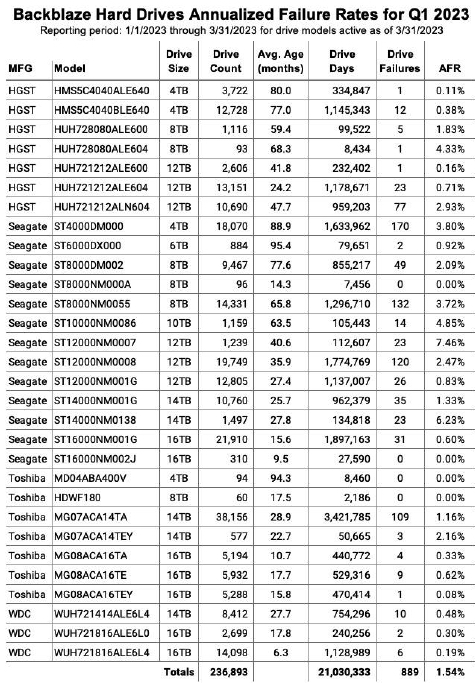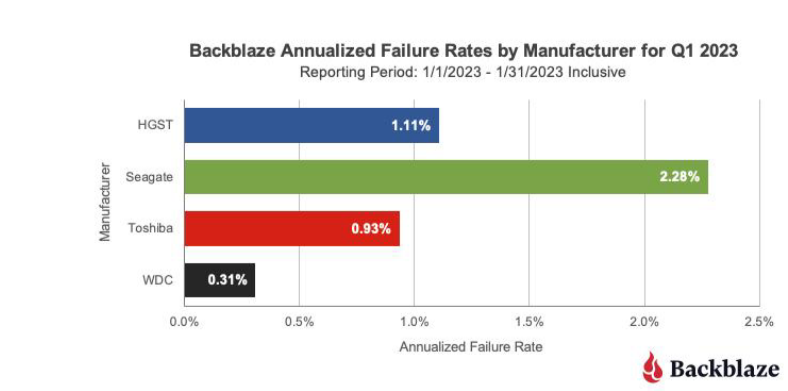Backblaze: HDDs Tend to Fail Before Three Years of Operation
Some drives typically fail even before their warranty period has expired.
Cloud storage and storage analytics specialist Backblaze has just released a juicy report covering the reliability of the hundreds of thousands of hard drives deployed on the company's servers — Backblaze managed 236,893 HDDs as of 1Q23. The report covers the reliability and failures experienced on the various models.
Taking into account Power-On-Hours for any failed HDD while excluding failed boot drives, drives that had no SMART raw attribute data, or drives with out-of-bounds data, Backblaze has seen 17,155 dead HDDs since its operational beginning. Averaged-out, the failed hard drives had an average operational runtime of only two years and six months. If you're in Europe, that's less durability than the minimum warranty required by law, which stands at three years.
Backblaze grouped the dead HDDs in 30 models, excluding those with less than 50 failures so as not to skew the results with outliers. Here are the models (ranging from 4TB through 12TB) in a neat table:

Backblaze noted some trends in its evaluation, and the table itself gives us some interesting data points. For one, we see that Seagate is the king of drive failures. Its 12TB Seagate ST12000NM0007 saw 2,023 failures, ending up with the greatest Average Failure Rate (AFR) at 7.46% and an average lifetime of just one year and six months. The second-worst drive model in Backblaze's statistics was another Seagate drive, the 14TB ST1400NM0138 drive saw an AFR of 6.23% The third worst model is HGST's 4TB HUH728080ALE604, with an annualized failure rate of 4.33%.
Backblaze's results could be interpreted as meaning that bigger HDDs tend to fail less often than smaller HDDs, but there are a number of caveats here. For one, Backblaze points out that all of its "small capacity" HDDs that were destined to fail already did: the company no longer utilizes 1, 1.5, 2, 3, or even 5 TB HDDs — all failures within those models are already "counted in" on Backblaze's failure rates. That isn't the case for higher capacity drives, which are also more likely to have a lower running time, as is generally the case for Backblaze's storage options.
Backblaze further analyzed its HDD pool by looking at average failure rates among manufacturers, with Seagate claiming a leading, average failure rate of 2.28%, while WDC claimed the least average failures with its 0.31% result. When looking at these numbers, it's important to remember that even Seagate's failure rate means that only 2.3 out of every hundred shipped HDDs stop spinning their platters before they should.

All in all, Backblaze ended up with an average failure rate for Q1 2023 of 1.54%, up quarter-over-quarter from 1.21% in Q4 2022 and also up year-over-year, where Q1 2022 registered a 1.22% AFR. This could mean that some models have a lower than expected durability and have started failing. It could also be a problem with a batch of drives, or from handling, installation, and operating conditions. Simply put, there's no way to say that "HDDs are becoming worse" from this data as there are too many unknowns.
Backblaze's Annualized Failure Rates report looks relatively aligned with similar HDD failure analysis conducted by Secure Data Recovery, an HDD, SSD, and RAID data recovery company. It looked at 2,007 HDDs and found their average life before failures to be set at around 2 years and 10 months. That's a mere four months apart from Backblaze's 2 years and six months result.
Here's hoping that both providers continue analyzing failure rates and providing that data publicly. And if you have important data you can't stomach losing, make sure you have a good backup strategy — even something as simple as an external storage device is better than nothing.
Get Tom's Hardware's best news and in-depth reviews, straight to your inbox.

Francisco Pires is a freelance news writer for Tom's Hardware with a soft side for quantum computing.
-
gggplaya The only drives I ever had fail on me were Seagates. Never again!!!!Reply
WD Red (CMR) drives in my NAS still going strong after 10+ years. -
Kamen Rider Blade Constant On/Off Power cycles for normal Civilian Operations don't help.Reply
Keeping the drives in one state, either On or Off is better for longevity. -
Sam Bi Stats needed for number read/writes, amount of data read/written and frequency. Otherwise this can be totally misleading.Reply -
Amdlova Seagate disks when have click automatic trow in the bin... western digital and toshiba drives last longer too long to be good. Here i reuse toshiba drivers on ps3 some drivers are when the ps3 launch lolReply -
dalauder The headline totally misinterprets the statistics. Hard drives that fail quickly, tend to fail quickly. That's all they really found.Reply
They didn't test the hard drives that last 10 years, and most do that. And, of course, we're ignoring what causes most of these hard drive failures anyways: bad power supplies. -
dalauder Reply
You'll only get that from manufacturer published testing, which is more or less provided as the warranty info.Sam Bi said:Stats needed for number read/writes, amount of data read/written and frequency. Otherwise this can be totally misleading. -
dalauder Reply
That reminds me of how I heard Google sourced its data center drives, keep in mind this is like 10 year old info. Their interpretation of data was that either disks were bad and failed quickly, or they didn't fail for 10+ years. So they believed they could get cheaper storage with greater reliability sourcing used drives for data centers.gggplaya said:The only drives I ever had fail on me were Seagates. Never again!!!!
WD Red (CMR) drives in my NAS still going strong after 10+ years.
So for a while, that's where the Gmail unlimited storage came from. -
ubercake Reply
I had multiple Maxtor drives die. When Seagate bought them, I knew to never buy a Seagate. I always bought WD Blacks until old-school SSDs and then M.2 drives became the craze. WD missed the bus since SSDs became commonplace.gggplaya said:The only drives I ever had fail on me were Seagates. Never again!!!!
WD Red (CMR) drives in my NAS still going strong after 10+ years. -
The only drive I've ever had fail on me in 40 odd years was an IBM Deskstar drive back in 1995. Still have a couple of old Maxtor RLL drives running in my vintage Atari MegaST.Reply
-
dalauder Reply
I dunno. I'm running a WD SN850X in my main right right now.ubercake said:I had multiple Maxtor drives die. When Seagate bought them, I knew to never buy a Seagate. I always bought WD Blacks until old-school SSDs and then M.2 drives became the craze. WD missed the bus since SSDs became commonplace.